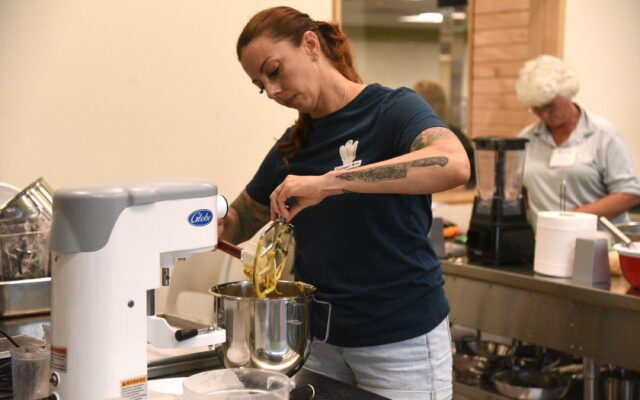
The University of Maine has brought culinary art instructors from their career tech high schools around the state to see what is happening in agriculture in Aroostook County.
UMaine received $300,000 from a Professional Development in Agriculture Literacy grant from the United States Department of Agriculture awarded in January 2021 as part of a four year program.
The Summer Institute run by UMaine is in its third year of the grant program with 14 chefs from various career technical high schools in Maine joining the tour this year. Maine Agriculture in the Classroom is a collaborator in UMaine’s Summer Institute.
“I felt like Aroostook County was underrepresented in the conversation about local food in Maine,” said Rob Dumas, executive chef and food science innovation coordinator and facility manager for the UMaine at Orono.
Part of the grant’s use is to help the high school career technical educators improve their programs back at their high schools with $2,000 mini grants awarded to six career technical education culinary arts programs over a three year period, said Willie Grenier, an educator for Maine Agriculture in the Classroom. The amount given out so far has been $28,000 from a total amount of $36,000.
“[Aroostook County] is an exciting part of where Maine’s local food scene is coming from,” said Kathy Savoie, cooperation extension professor for the University of Maine in Orono.
UMaine officials and Grenier, representing Maine Agriculture in the Classroom, are hoping to influence the choices the culinary arts teachers make in their classrooms and create ripple effects for students to make conscious choices of where they procure their foods in professional careers.
The tour is meant to have the culinary arts instructors be the students to experience different ingredients and learn how they taste and best use them for recipes.

Culinary arts instructor and chef Heidi Parent of Capital Area Technical Center in Augusta prepares a pastry in the Reed Dining Hall at Northern Maine Community College in Presque Isle on July 10 as part of the University of Maine’s culinary tour of Aroostook County. (Paul Bagnall | The Star-Herald)
Each chef worked on dishes in pairs at cooking stations inside the Reed Dining Commons at Northern Maine Community College working on their dishes from 95 percent locally sourced ingredients.
On the first night of the tour, the chefs cooked chicken they got from Yost Farms, which they coated in mustard and maple syrup, along with strip steaks from Hatch’s Custom Processing in Crystal, and potatoes from Wood Prairie Family Farm they roasted. Another focus was using Maine grains grown in Aroostook County to make cream puffs.
The culinary tour will last four days in Aroostook County with the chefs visiting places like Buckwheats in Fort Kent to learn about local grains and chicken production at Yost Farms in Blaine.
Part of UMaine’s goal is to visit multigenerational farm land along the sloping hills of Aroostook County and other bigger commercial operations like Fox Family Potato Chips Inc. in Mapleton.
“The scale of agriculture up here is much larger than what we see in other parts of the state generally,” Dumas said.
Another stop will be to Micmac Farms to see their recirculating aquaculture system for brook trout on Wednesday, July 12.
“The idea is we are increasing agricultural literacy, so that these chefs understand better where the food is coming from,” Grenier said. “So they can trade that to their students.”
The students learning about Maine foods taught by the participating culinary arts teachers can bring that knowledge of how valuable the land is and the process the food takes to get to the plate.
This year the schedule for the summer institute happened to be alongside the Maine Potato Blossom Festival, Dumas was able to schedule and put together the cooking competition on the tour’s second to last day in Aroostook County.
Maine Agriculture in the Classrooms has been involved with the Maine Potato Blossom Festival and the Northern Maine Fair with grants and educational programing, Grenier said.
Last year, UMaine visited the coast. Each year the program goes to a different part of the state.







